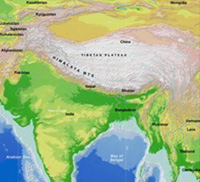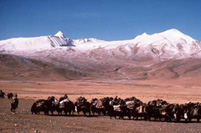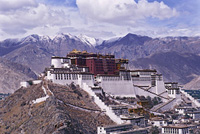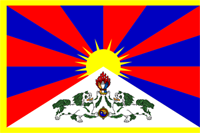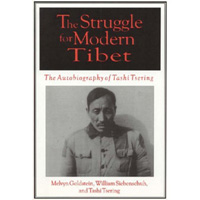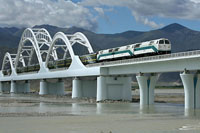
Jochen Welsch
Wachusett Regional High School
Tibet in the AP World History Framework
Political, social and economic revolutions created and transformed nation-states from 1750-1919 and spread the ideals of liberty, equality and brotherhood throughout much of the world. Europe emerged as a dynamic engine of change and parlayed its technological advantage to dominate most of the rest of the world. Humiliated but also inspired by european military, economic, and scientific prowess, Japan's Tokugawa Shogunate, Czarist Russia, Qing China the Ottoman Empire, and the newly independent nations of Latin America attempted, with varying success, to control their destinies in a rapidly changing world.
Tibet became embroiled in rivalries between Mongols and Manchus as well as expansionist Himalayan states like Nepal. The "Great Game" between Russia and Great Britain further complicated Tibet's place in the world although Tibet was not without options. Ultimately Tibet used the chaos following China's 1911 revolution, as well as an anarchic world situation, to declare its independence. Independence, however, did not translate to freedom and modernism as defined as by the ideals of the French and Industrial Revolutions. Here Tibet's history is instructive as a tool to compare revolutions in France (1789), and the USA (1776,) with those of Haiti (1804) Mexico (1910), China (1911) and Russia (1917.) Click on the powerpoint, Societies in Transition to explore Tibet's history from 1750-1919.
Resources for further exploration and/or lesson plans:
Click on the images for any of these three books for reviews. They have been well received for their exploration of Tibet's history in the last two centuries.
 The Great Game: The Struggle for Empire in Central Asia by Peter Hopkirk
The Great Game: The Struggle for Empire in Central Asia by Peter Hopkirk
 Trespassers on the Roof of the World: The Secret Exploration of Tibet by Peter Hopkirk
Trespassers on the Roof of the World: The Secret Exploration of Tibet by Peter Hopkirk
 A History of Modern Tibet by Melvyn Goldstein
A History of Modern Tibet by Melvyn Goldstein
What makes a nation ready for revolution? Why are some successful and others less so? What does it mean to be modern? What role do foreigners play in instigating revolutions? In preventing them? Discuss these questions with your students as they pertain to Tibet and other nations.
Discuss the legacy of imperialism on Tibet and an African country. I highly recommend looking into the Congo by reading Adam Hochschild's King Leopold's Ghost. This could be a writing assignment or presentation for your students. Other good countries to explore include India, Mexico or Iraq.
 This site was created by Jochen Welsch at the NEH Summer Institute "Literatures, Religions, and Arts of the Himalayan Region," held at the College of the Holy Cross, Summer 2008.
This site was created by Jochen Welsch at the NEH Summer Institute "Literatures, Religions, and Arts of the Himalayan Region," held at the College of the Holy Cross, Summer 2008.